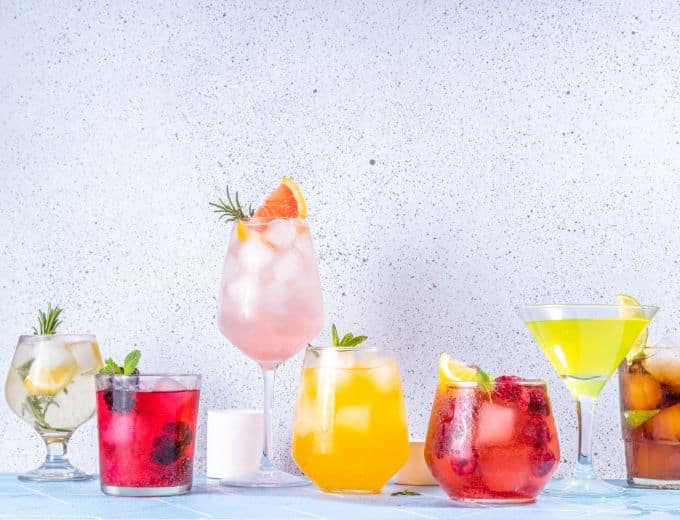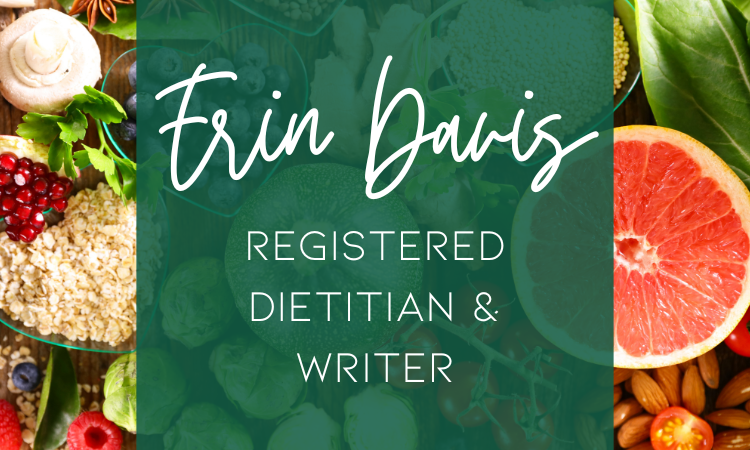You’ve been told you have PCOS and you’ve been making healthy lifestyle choices. But does that mean you have to skip happy hour? Can you have a glass of wine at dinner? Today, I’m talking about alcohol and PCOS.
Polycystic ovarian syndrome, or PCOS, affects 7-15% of reproductive-age women. That means it is likely that you, or someone you know has PCOS.
PCOS is a leading cause of infertility in women. While medication is often used in the treatment of PCOS symptoms, lifestyle changes are essential in managing the condition.
If you’re new here, welcome! I’m Erin, an anti-diet dietitian who works with people who want to manage conditions like diabetes and PCOS, with intuitive eating.
Why, as a diabetes care and education specialist, do I care about PCOS? There’s a strong link between PCOS and insulin resistance, one of the risk factors for developing diabetes.
Plus, women with PCOS have been given garbage diet recommendations for years. Like, “just stop eating carbs”. Um, that doesn’t work long-term and it leaves a person feeling hopeless.
So if you have PCOS, I’m on your side. I want to dive into the research to give you valuable, doable recommendations.
One question I often get is about alcohol. For a good reason—the majority of people partake in alcohol consumption. According to recent data, 67% of people drank in the last year.

Can you drink alcohol when you have PCOS? What impact does alcohol have on your hormones?
Today, I’m addressing these questions and more. Let’s jump in!
Please note: As an Amazon Associate, I earn from qualifying purchases.
What is PCOS?
Polycystic ovarian syndrome, or PCOS, is one of the most common hormonal conditions affecting women. It’s characterized by increased androgens, cysts on the ovaries, and irregular or no ovulation.
While both men and women produce androgens, they are typically considered male sex hormones. Elevated androgen levels can cause the following symptoms:
- Acne
- Facial hair
- Alopecia, or hair loss
Besides those typically unwanted symptoms, exposure to elevated androgens is associated with insulin resistance.

Insulin resistance is your body’s inability to use insulin well. In other words, your body makes insulin, often too much. But your body doesn’t respond to it.
As a result, your blood sugars may be high, or you may feel hungry all.of.the.time. Insulin resistance can also make you feel like crud after you eat a simple carb food with little protein or fat.
Eating a combination of carbs, protein, and fat at meals can help regulate your blood sugars. But what happens if you add in an alcoholic beverage?
Alcohol and PCOS

Alcohol often goes hand-in-hand with social situations and celebrations. Some find a glass of wine at night a mandatory ritual for optimal relaxation.
Yes, it’s well-known that drinking should be done in moderation. Many are aware of the long-term effects of alcohol consumption. But its impact on our hormonal balance is often overlooked.
Hormones act as messengers, regulating essential bodily functions such as metabolism, mood, sleep, and reproduction. We want our hormones to work at top capacity.
When it comes to alcohol and PCOS, we’re concerned about the hormonal endgame. Here’s a rundown of how alcohol impacts the different hormones in your body:
Alcohol and sex hormones
Alcohol can interfere with the delicate balance of sex hormones, such as estrogen and testosterone.
In women, alcohol can disrupt menstrual cycles and contribute to hormonal imbalances, potentially impacting reproductive health.
One study found that even a moderate consumption of 30 grams of alcohol (i.e., 2 drinks daily), significantly increased estrogen.
High estrogen levels can cause irregular periods and weight gain in women. The very things you are likely already struggling with when you have PCOS.
Additionally, it was discovered that 30 grams of daily alcohol increases DHEAS levels, a male sex hormone. Too much DHEAS leads to excess body and facial hair and acne, irregular periods, and alopecia. Sound familiar?
It should be noted that while 1 drink per day did have a mild impact on estrogen and DHEAS levels, it wasn’t statistically significant.
Alcohol and insulin

Alcohol can influence insulin sensitivity, potentially leading to disruptions in blood sugar levels.
For individuals with diabetes or those at risk, managing alcohol intake is crucial to maintaining stable insulin levels and overall health.
Managing alcohol intake is the key term. Moderation is everything. Moderate alcohol intake may improve insulin sensitivity.
What’s moderate? One drink per day for women (5 oz wine, 12 oz beer or hard seltzer, 1.5 oz liquor).
Something to consider when it comes to blood sugar and insulin is the type of drink you are choosing.
Suppose you are opting for a high-sugar margarita or blended drink. You may find yourself crashing as your blood sugar spikes and plummets.
On the other hand, you may be taking a medication or supplement (like metformin, berberine, or inositol) that increases sensitivity to insulin. You may end up with low blood sugar if you are skipping a meal and going right for a drink.
Combat wild swings in blood sugar by pairing your alcohol with a meal or hearty snack (including a complex carb, protein, and fat).
Alcohol and cortisol
Cortisol plays a crucial role in the body’s fight-or-flight response. Excessive alcohol consumption has been linked to elevated cortisol levels, potentially contributing to chronic stress and its associated health issues.
Those health issues include weight gain, sleep disturbances, and impaired immune function. As a woman with PCOS, you are already at risk for greater emotional stress.
Add in a couple of glasses, or (ahem…) a bottle of wine, and you’ve potentially compounded the issue. Those drinks you use to unwind may be doing the exact opposite.
Other impacts of alcohol on the body
Besides the impact on your hormones, alcohol can have other effects on the body. Here are a few of them:
Alcohol and your liver

The liver is responsible for metabolizing alcohol, and you DO NOT want to overwork this powerhouse organ.
Your liver does many amazing things for your body. Between sustaining you while you fast, processing nutrients, purifying your blood, and other important functions in between, you need a healthy liver.
Excessive drinking can damage the liver, there’s no doubt. Too much alcohol can lead to cirrhosis of the liver and liver cancer.
This can impact the liver’s ability to metabolize hormones effectively, further contributing to hormonal imbalances.
Alcohol and sleep

I believe sleep is an overlooked health behavior in the treatment of PCOS. Poor sleep=poor hormonal health.
Quality sleep is essential for hormonal regulation, and alcohol’s impact on sleep patterns is well-documented.
It’s not just the sleep and wake hormones (melatonin and cortisol) I’m talking about. Sleep impacts your sex hormones and appetite hormones, too.
Yes, alcohol may initially make you sleepy, but it can disrupt your sleep cycle and subsequently you’ll have to deal with fatigue and sluggishness.
Something to ponder: what do you eat when you are tired? Nutrient-rich foods, or ultra-processed comfort foods?
Alcohol and inflammation
Not only does alcohol have an impact on your hormones and liver, but it is also linked with inflammation.
Inflammation does a number on your body, including increased risk for diabetes, liver disease, and nervous system damage.

Alcohol and PCOS: Moderation is Key
While the effects of alcohol on hormones are clear, it’s important to note that moderation is key. Occasional, moderate alcohol consumption may not have significant long-term effects on hormonal balance.
However, excessive and chronic alcohol intake can lead to a host of health issues, including hormonal disruptions.
To minimize swings in blood sugar, pair your drink with a meal or snack.
Remember, moderate alcohol consumption is one drink per day for women and two for men. That’s 12 oz of beer or hard seltzer, 5 oz of wine, or 1.5 oz of liquor.
Are you drinking socially? Try to alternate bubbly drinks like sparkling water or prebiotic soda. Or a mocktail.

You can also ask for lemonade or other non-alcoholic drinks to be served in a fancy glass to feel like you are a part of the festivities.
If you’re regularly drinking at home, evaluate your “why”. Do you feel you need it to relax? Are there any other relaxing activities you can do to relieve stress?
Is it merely a habit to have a couple of drinks while making dinner? Perhaps you just need to re-route your brain with a new habit.
In summary, moderate alcohol intake will not derail your health. Go ahead and have a celebratory drink with friends, family, or coworkers.
However, if you find you are regularly exceeding one drink per day, I encourage you to try to cut back. Need help finding ways to relax and reduce stress? Or to further improve your hormonal health? I’m here to help.
Managing your health shouldn’t be overwhelming. Book a free discovery call to see if my services align with your health goals.
References
- Collée J, Mawet M, Tebache L, Nisolle M, Brichant G. Polycystic ovarian syndrome and infertility: overview and insights of the putative treatments. Gynecol Endocrinol. 2021;37(10):869-874. doi:10.1080/09513590.2021.1958310
- Hoeger KM, Dokras A, Piltonen T. Update on PCOS: Consequences, Challenges, and Guiding Treatment. J Clin Endocrinol Metab. 2021;106(3):e1071-e1083. doi:10.1210/clinem/dgaa839
- Starek-Świechowicz B, Budziszewska B, Starek A. Alcohol and breast cancer. Pharmacol Rep. 2023;75(1):69-84. doi:10.1007/s43440-022-00426-4
- Mahabir S, Baer DJ, Johnson LL, et al. The effects of moderate alcohol supplementation on estrone sulfate and DHEAS in postmenopausal women in a controlled feeding study. Nutr J. 2004;3:11. Published 2004 Sep 7. doi:10.1186/1475-2891-3-11
- Remchak ME, Piersol KL, Bhatti S, Spaeth AM, Buckman JF, Malin SK. Considerations for Maximizing the Exercise “Drug” to Combat Insulin Resistance: Role of Nutrition, Sleep, and Alcohol. Nutrients. 2021;13(5):1708. Published 2021 May 18. doi:10.3390/nu13051708
- Piano MR. Alcohol’s Effects on the Cardiovascular System. Alcohol Res. 2017;38(2):219-241.
- Yang JH, Kweon SS, Lee YH, et al. Association between Alcohol Consumption and Serum Cortisol Levels: a Mendelian Randomization Study. J Korean Med Sci. 2021;36(30):e195. Published 2021 Aug 2. doi:10.3346/jkms.2021.36.e195
- Marschalek ML, Marculescu R, Schneeberger C, Marschalek J, Dewailly D, Ott J. A case-control study about markers of stress in normal-/overweight women with polycystic ovary syndrome and in controls. Front Endocrinol (Lausanne). 2023;14:1173422. Published 2023 May 16. doi:10.3389/fendo.2023.1173422
- Morssinkhof MWL, van Wylick DW, Priester-Vink S, et al. Associations between sex hormones, sleep problems and depression: A systematic review. Neurosci Biobehav Rev. 2020;118:669-680. doi:10.1016/j.neubiorev.2020.08.006
- Chaput JP, McHill AW, Cox RC, et al. The role of insufficient sleep and circadian misalignment in obesity. Nat Rev Endocrinol. 2023;19(2):82-97. doi:10.1038/s41574-022-00747-7
- Koob GF, Colrain IM. Alcohol use disorder and sleep disturbances: a feed-forward allostatic framework. Neuropsychopharmacology. 2020;45(1):141-165. doi:10.1038/s41386-019-0446-0
- Finelli R, Mottola F, Agarwal A. Impact of Alcohol Consumption on Male Fertility Potential: A Narrative Review. Int J Environ Res Public Health. 2021;19(1):328. Published 2021 Dec 29. doi:10.3390/ijerph19010328
- Ren T, Mackowiak B, Lin Y, Gao Y, Niu J, Gao B. Hepatic injury and inflammation alter ethanol metabolism and drinking behavior. Food Chem Toxicol. 2020;136:111070. doi:10.1016/j.fct.2019.111070
- Roberto M, Patel RR, Bajo M. Ethanol and Cytokines in the Central Nervous System. Handb Exp Pharmacol. 2018;248:397-431. doi:10.1007/164_2017_77
Disclaimer: This information is intended as a self-help tool for your own use, at your own risk. My opinions do not reflect the values, thoughts, or opinions of the Academy of Nutrition and Dietetics or other professional health organizations.
About the author
Erin is a registered dietitian and diabetes educator with almost 20 years of experience. She specializes in weight-inclusive diabetes care and prevention, intuitive eating, fitness, and women’s health. She works as a consultant and writer in the health and wellness space. Erin is passionate about empowering people to manage their own health and to have peace with food.


